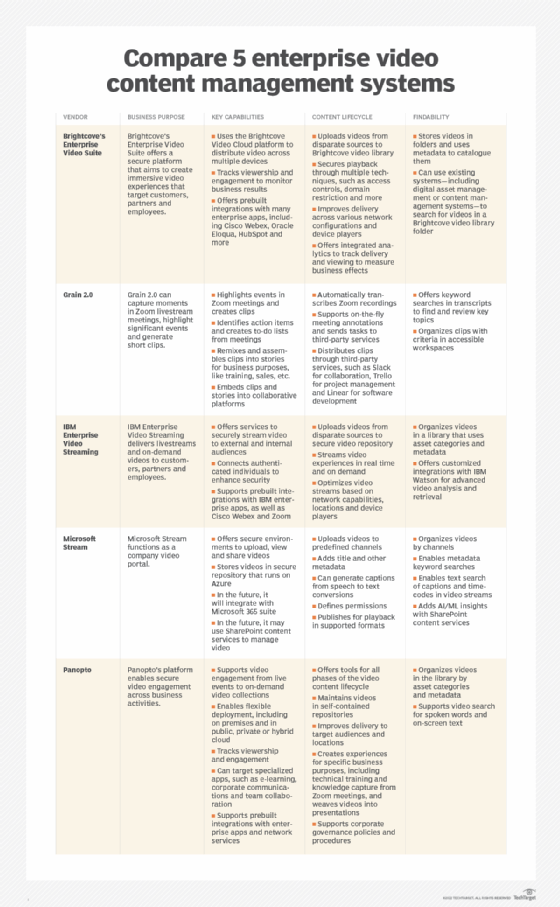
Getty Images/iStockphoto
How to choose an enterprise video content management system
With more video content than ever, many organizations have adopted video content management systems. This comparison chart highlights five different vendors and what they offer.
As organizations embrace digital workspaces, they increasingly rely on video to communicate and share information.
Many enterprise video applications can support business areas like product marketing, corporate training, employee onboarding and team collaboration. Content teams must manage videos like business documents and images. An enterprise video content management system (CMS) can enable digital experiences with targeted business purposes and help organizations manage videos effectively and efficiently to address a wide range of business challenges.
Pros and cons of enterprise video content management systems
With the advent of the cloud and affordable recording devices -- including smartphones and tablets -- employees can easily create and distribute videos, transforming how people work.
Video content management incorporates various technologies, platforms and services that store and distribute videos within an organization. As management capabilities improve, video content management can help develop next-generation enterprise apps.
The pros
From one perspective, video is simply another content type within an enterprise app. Yet, enterprise video CMSes offer benefits to manage enterprise content and digital assets.
Enterprise security. Organizations need video CMSes with enterprise-scale security mechanisms to ensure only people and processes with appropriate permissions can view and modify particular videos.
A single source of truth. An organization must distinguish between works in progress and a video's final version. Organizations must use more than a network file-sharing system and establish a single source of truth, which video CMSes offer.
Corporate governance. Organizations face challenges regarding corporate governance. Many video CMS vendors offer policies, procedures and automated processes to mitigate risks and comply with regulatory mandates while enhancing productivity and meeting business needs.
The cons
Additionally, enterprise video content management must address three main challenges.
Storage. Organizations may struggle more to store and distribute videos than documents and photos, as videos have larger file sizes stored in various file formats. Additionally, video reaches many different endpoints, including web browsers, mobile devices and kiosks, each with distinct viewers and display resolutions. Content managers may require special technologies to optimize distribution across digital networks for successful playback.
Content lifecycle. Videos have widely varied content lifecycles -- beginning with creation and source, then including storage, accessibility, distribution, long-term retention and removal at its end of life.
Video creation is a critical and challenging part of the content lifecycle. Depending on the video's business purpose, creation can have various moving parts and an entire production team or require a few people and a more streamlined approach. Both approaches can create new obstacles or problems to solve.
Findability. Content managers often struggle to organize, find and discover videos, which can be more difficult to catalog than other content types. To alleviate these challenges, content teams can catalog videos with metadata -- titles, dates, summaries and other keywords. Video management should use information architecture categories and extend them based on the architectural design principles.
In addition, videos capture motion and sounds, which may require speech-to-text analysis. Organizations need smart tools based on AI technologies that can automatically understand a video's context, detect different activities, recognize images, identify products, analyze sentiments and sense scene changes.
Vendor comparisons
Many vendors offer video content management capabilities, ranging from predefined systems to extensible video platforms with value-added services. The comparison chart highlights five different vendors in the market, each with a particular strength.
Brightcove's Enterprise Video Suite. Brightcove offers a secure platform that includes immersive video experiences and flexible delivery for corporate marketing.
Grain 2.0. Grain Intelligence Inc.'s system analyzes Zoom meetings and converts livestream Zoom recordings into short clips to highlight action items and enhance team collaboration.
IBM Enterprise Video Streaming. IBM's system offers video streaming services at scale and optimizes delivery across multiple network configurations, geographies and customer endpoints.
Microsoft Stream. Microsoft offers a video portal called Stream. The vendor has announced plans to integrate Stream into the Microsoft 365 suite, adding AI and other platform services to enhance security and video delivery.
Panopto. This vendor offers a comprehensive platform for secure video engagement with specialized capabilities that support specific business activities, such as e-learning, online training and customer communications.
The enterprise video content management market is dynamic, composed of industry stalwarts, startups and new entrants that offer unique capabilities while existing vendors continue to enhance features and introduce innovative services.








